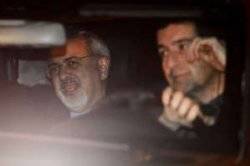Iran and world powers have failed to clinch a deal on Tehran's disputed nuclear programme despite intensive negotiations but will meet again on November 20 for fresh talks, officials say.
EU diplomatic chief Catherine Ashton said late on Saturday that there had been "three days of intense and constructive discussions" but that Tehran and the P5+1 group of world powers, consisting of the US, UK, France, China, Russia, Germany and the EU, would have to meet again.
"A lot of concrete progress has been achieved but some issues remain," she said, adding: "Our objective is to reach a conclusion and that's what we'll come back to try to do."
Iranian Foreign Minister Mohammad Javad Zarif said he was not discouraged despite the failure of the talks.
"I'm not disappointed at all because the meeting we just had, very long, running after midnight, was a good meeting," Zarif said. "We are working together and hopefully we will be able to reach an agreement when we meet again."
Zarif's meeting with his counterparts from the United States, United Kingdom, France, Russia, China, Germany and the European Union went late into the night on Saturday, reported Al Jazeera's James Bays in Geneva, where the talks were being held.
Addressing the press following the meeting, US Secretary of State Kerry said that Washington remains "determined to make certain" Iran does not acquire a nuclear weapon. While Kerry expressed optimism that a deal would be struck in the coming weeks, he also said that the window for a diplomatic solution would not be open "indefinitely".
The meeting on November 20 will occur at the political directors level, but Kerry suggested that foreign ministers could reconvene shortly after that date.
Earlier, France had said that there were serious stumbling blocks to a long-sought accord with Iran, as unity among Western
powers appeared to be fraying in the talks aimed at getting Tehran to curtail its nuclear programme.
French doubt
As discussions stretched on into a third day on Saturday, French Foreign Minister Laurent Fabius had expressed doubt over whether those gathered would be able to succeed in nailing down an interim deal.
"As I speak to you, I cannot say there is any certainty that we can conclude," Fabius said on Saturday on France Inter radio, stressing that Paris could not accept a "sucker's deal".
His comments were the first to provide some specifics on the obstacles at the Geneva talks.
Fabius' remarks came as US Secretary of State John Kerry and counterparts from Britain, France and Germany negotiating with Iran consulted in the Swiss city on how to resolve the obstacles at the talks.
British Foreign Secretary William Hague said the talks have achieved "very good progress", but much more needed to be agreed and it was unclear if this would happen by the end of the day.
"We are very conscious of the fact that real momentum has built up in these negotiations," he told reporters. "So we have to do everything we can to seize the moment."
In an indication that the atmosphere of cordiality that reigned in the first round of talks last month and first two days of discussions this week was dissipating, Iran's Deputy Foreign Minister, Abbas Araqchi, told Mehr news agency that his counterparts from the six powers "need constant coordination and consultation in order to determine [their] stances".
The main sticking points appeared to include calls for shutdown of the Arak nuclear reactor southeast of Tehran that could eventually help produce weapons-grade nuclear fuel, the fate of Iran's stockpile of higher-enriched uranium and the nature and sequencing of relief from economic sanctions sought by Tehran.
Gap in stances
Iranian media quoted Araqchi as saying "the issues are serious and there is still a gap in stances", and that the talks would probably end later in the day and be resumed at a later date.
The US Secretary of State said on Friday there were "some very important issues on the table that are unresolved. It is important for those to be properly, thoroughly addressed".
He avoided the media on Saturday before engaging in another two hours of intensive talks with Iranian Foreign Minister Zarif and European Union foreign policy chief Catherine Ashton. The three had earlier met for five hours on Friday night.
Foreign Ministers from all five permanent UN Security Council members and Germany were due to take part in Saturday's talks with Zarif, but Chinese representative was still absent.
The Western powers remain concerned that Iran is continuing to amass enriched uranium not for future nuclear power stations, as Tehran says, but as potential fuel for nuclear warheads.
They are searching for a preliminary agreement that would restrain Iran's nuclear programme and make it more transparent for UN anti-proliferation inspectors.
PHOTO CAPTION
Iranian Foreign Minister Mohammad Javad Zarif (L) leaves his hotel on November 8, 2013 in Geneva.
Aljazeera


 Home
Home Discover Islam
Discover Islam Quran Recitations
Quran Recitations Lectures
Lectures
 Fatwa
Fatwa Articles
Articles Fiqh
Fiqh E-Books
E-Books Boys & Girls
Boys & Girls  Women
Women










